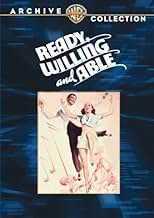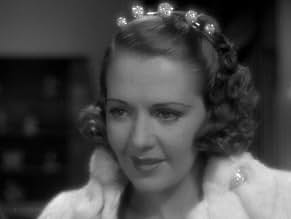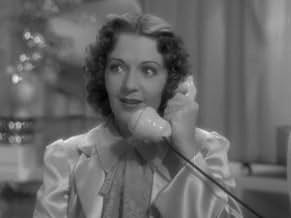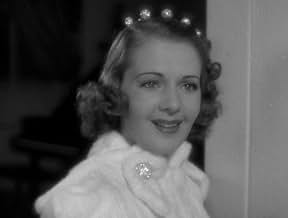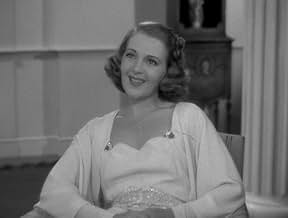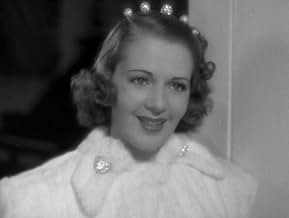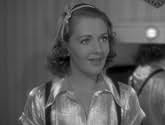Two songwriters want to cast a British star in their new show.Two songwriters want to cast a British star in their new show.Two songwriters want to cast a British star in their new show.
- Nominated for 1 Oscar
- 1 nomination total
Al Shaw
- Moving Man
- (as Shaw)
Sam Lee
- Moving Man
- (as Lee)
Lillian Kemble-Cooper
- Mrs. Buffington (Credits)
- (as Lillian Kemble Cooper)
- …
Featured reviews
A great deal of credited and uncredited writing talent went into this screenplay expansion of Richard Macaulay's Saturday Evening Post story about a songwriting duo in New York City who are promised show-money if they can get land a musical-comedy starlet from the London stage for their latest production, "Fair Lady" (!). Busy, friendly musical has some good wisecracking lines, but not enough star-power in the cast. Ruby Keeler has a rather inert role as a would-be performer who is hired for the lead by mistake, yet it's a part which doesn't allow her to shine (only to be a shrinking violet). Keeler does do a tap-dance routine on the keys of a huge typewriter, but the choreography is lax (despite netting an Oscar nomination!) and certainly isn't as imaginative as the set design. Real-life songwriting team Johnny Mercer and Richard Whiting contributed several songs, though the best of them ("Too Marvelous For Words") is sung ad nauseum. ** from ****
Lee Dixon and Ross Alexander are minor actors in the history of Hollywood and here they both star as two struggling guys trying to peddle their musical show. But when you read their back story on IMDb, they are a very sad couple of guys. Before this film even debuted, Alexander (Barry) was dead from a self-inflicted gunshot wound (he was 29)! And, less than a decade later, Dixon (Pinky) would be dead...a guy who drank himself to death at age 42! Talk about tragic! Fortunately, their co-star, Ruby Keeler, had a much happier life!
When the film begins, Pinky and Barry are both struggling to market their new show. Fortunately, they just found a backer--and in order to get this backing they need to sign a British actress. When they go to meet her, the duo make a mistake and accidentally hire an unknown chorus girl (Ruby Keeler) with the same name. She's excited about the opportunity and so she keeps quiet and just accepts the offer. Unfortunately, when folks learn the truth, the show closes. What's next? See the film.
What follows at the end of the movie are a whole bunch of production numbers. Some are a bit dull, though the typewriter sequence is pretty amazing to watch. Overall, a passable bit of entertainment...but not much more. The songs aren't all that memorable and the plot is slight to say the least. The film could have used a bit more comedy to lighten the mood.
When the film begins, Pinky and Barry are both struggling to market their new show. Fortunately, they just found a backer--and in order to get this backing they need to sign a British actress. When they go to meet her, the duo make a mistake and accidentally hire an unknown chorus girl (Ruby Keeler) with the same name. She's excited about the opportunity and so she keeps quiet and just accepts the offer. Unfortunately, when folks learn the truth, the show closes. What's next? See the film.
What follows at the end of the movie are a whole bunch of production numbers. Some are a bit dull, though the typewriter sequence is pretty amazing to watch. Overall, a passable bit of entertainment...but not much more. The songs aren't all that memorable and the plot is slight to say the least. The film could have used a bit more comedy to lighten the mood.
Mistaken for a famous British singing star, an American college girl decides she's READY, WILLING AND ABLE to conquer Broadway - especially after meeting the young scriptwriter who's producing the play...
A fine example of the musical comedies which Warner Brothers seemed to produce so effortlessly during the 1930's, it's a shame this film has become so obscure. With good production values & a snappy storyline, it's still a pleasant entertainment. The major missing component is Busby Berkeley; the final production number, with Ruby Keeler & dancer Lee Dixon hoofing it upon the keys of a giant typewriter, fairly cries for the Master to send it over the top.
Pert & pretty, Miss Keeler is, as always, much fun to watch. Many of her scenes are given the added attractions of the lovely Carol Hughes, playing her best friend. Wini Shaw, as a singer with too much past & tart-tongued secretary Jane Wyman also contribute to the fun.
The comedy relief is largely handled by Allen Jenkins as a loudmouthed agent, Louise Fazenda as a faded Shakespearean actress & Hugh O'Connell as a society fuddy-duddy. Comic cameos by E. E. Clive & Lillian Kemble-Cooper as an English knight & lady, and Barnett Parker as a helpful British butler, are also welcome. Movie mavens will spot an unbilled Carlyle Moore Jr. as a dockside reporter.
Ultimately, though, there is sadness attached to this film. The leading man, Ross Alexander, shot himself before the film could be released. This was his final film; he was only 29. Born Ross Smith in Brooklyn in 1907, Alexander had the personality, talent & good looks which should have spelled significant stardom. But Hollywood is notoriously unpredictable, and Alexander, unhappy with the way his career was going & obviously still troubled by the gunshot suicide of his first wife in December of 1935, placed a pistol to his own head on January 2, 1937.
Once dead, it was Warner Brothers that paid him the final indignity. Having a completed film with a star who was not only deceased, but a suicide as well, was a bit more than the Studio wanted to deal with. So, cutting their losses, they gave Ross Alexander fifth place billing on the lineup of performers for READY, WILLING AND ABLE, where he should have received first or second.
Outside of his appearance in A MIDSUMMER NIGHT'S DREAM (1935), he is almost forgotten now. Ross Alexander was a victim of the Hollywood system and his own private anguish, each of which fed on the other. He should be remembered as a fine young actor, who, in a very few years, brought lots of enjoyment to movie audiences. This is typified by his best scene in READY, WILLING AND ABLE, where he introduces the Johnny Mercer lyrics for 'Too Marvelous For Words,' by gently reciting them to Ruby Keeler. It is a tremendously poignant few moments.
A fine example of the musical comedies which Warner Brothers seemed to produce so effortlessly during the 1930's, it's a shame this film has become so obscure. With good production values & a snappy storyline, it's still a pleasant entertainment. The major missing component is Busby Berkeley; the final production number, with Ruby Keeler & dancer Lee Dixon hoofing it upon the keys of a giant typewriter, fairly cries for the Master to send it over the top.
Pert & pretty, Miss Keeler is, as always, much fun to watch. Many of her scenes are given the added attractions of the lovely Carol Hughes, playing her best friend. Wini Shaw, as a singer with too much past & tart-tongued secretary Jane Wyman also contribute to the fun.
The comedy relief is largely handled by Allen Jenkins as a loudmouthed agent, Louise Fazenda as a faded Shakespearean actress & Hugh O'Connell as a society fuddy-duddy. Comic cameos by E. E. Clive & Lillian Kemble-Cooper as an English knight & lady, and Barnett Parker as a helpful British butler, are also welcome. Movie mavens will spot an unbilled Carlyle Moore Jr. as a dockside reporter.
Ultimately, though, there is sadness attached to this film. The leading man, Ross Alexander, shot himself before the film could be released. This was his final film; he was only 29. Born Ross Smith in Brooklyn in 1907, Alexander had the personality, talent & good looks which should have spelled significant stardom. But Hollywood is notoriously unpredictable, and Alexander, unhappy with the way his career was going & obviously still troubled by the gunshot suicide of his first wife in December of 1935, placed a pistol to his own head on January 2, 1937.
Once dead, it was Warner Brothers that paid him the final indignity. Having a completed film with a star who was not only deceased, but a suicide as well, was a bit more than the Studio wanted to deal with. So, cutting their losses, they gave Ross Alexander fifth place billing on the lineup of performers for READY, WILLING AND ABLE, where he should have received first or second.
Outside of his appearance in A MIDSUMMER NIGHT'S DREAM (1935), he is almost forgotten now. Ross Alexander was a victim of the Hollywood system and his own private anguish, each of which fed on the other. He should be remembered as a fine young actor, who, in a very few years, brought lots of enjoyment to movie audiences. This is typified by his best scene in READY, WILLING AND ABLE, where he introduces the Johnny Mercer lyrics for 'Too Marvelous For Words,' by gently reciting them to Ruby Keeler. It is a tremendously poignant few moments.
Ross Alexander was one of those unfortunates of life. He was good at the acting business and was given roles that would normally had gone to Dick Powell if he wasn't so busy. The trouble was that he was gay, and because of that in the 1930's, he took to the drink. He made "Ready and Willing" with Ruby Keeler in 1937 and then shot himself. His last picture doesn't stand out all that much as the story of "putting on a show" seemed to be a continuing serial throughout the '30's - but, he is quite good in it and delivers the main song "Too Marvelous for Words" first as a recitation and then in song - a couple of times - and his warbling is quite pleasing. Even though he was the leading man in this picture you can tell what the Warner Bros thought of him as his name is fifth on the list.
Ruby Keeler comes in as the love interest although that isn't clear at the start. She doesn't get to do all that much in the way of dancing about as in this picture as she is there for her acting ability. The plot maneuvers itself all over the place - there is mistaken identity, the putting on of a show, ineffectual fiancés, old ham actresses, actresses coming over from England, movie moguls, lyricists continually writing songs, Italians getting bamboozled and threatening landladies. Still, all this allows us to enjoy a few assorted character actors. Why there is even a short outing for two vaudevillians - Shaw and Lee in amongst E. E. Clive as a dimwitted Knight of the Realm, Barnett Parker as the quintessential English waiter, May Boley as the requisite fat landlady, the Romanian Adrian Rosley imitating Henry Armetta's typical Italian, Louise Fazenda as a ham actress who gets her Shakespeare all mixed up and Hugh O'Connell as whatever it is he is supposed to be. Without these characters doing their stuff the picture would have fallen quite flat.
As Ruby Keeler wasn't asked to sing, we are entreated to Wini Shaw coming in and doing that for her by way of a twist in the plot. She doesn't have all that much to do but her singing voice is a welcome addition. Also in lead roles we have Allen Jenkins as a theatrical agent, lowering the tone as per usual, Carol Hughes as Ruby Keeler's friend and Lee Dixon as Ross Alexander's theatrical partner. Also showing up briefly is Jane Wyman.
They don't make pictures like this anymore because everybody has now become too sophisticated and serious. Such a pity because it is pictures like these which are total frothy nonsense that I find highly entertaining and marvelous for taking one's mind away from the awful goings on in the world. It's fun and it's quite obvious from the finished product that everyone was having a rollicking good time making it.
Ruby Keeler comes in as the love interest although that isn't clear at the start. She doesn't get to do all that much in the way of dancing about as in this picture as she is there for her acting ability. The plot maneuvers itself all over the place - there is mistaken identity, the putting on of a show, ineffectual fiancés, old ham actresses, actresses coming over from England, movie moguls, lyricists continually writing songs, Italians getting bamboozled and threatening landladies. Still, all this allows us to enjoy a few assorted character actors. Why there is even a short outing for two vaudevillians - Shaw and Lee in amongst E. E. Clive as a dimwitted Knight of the Realm, Barnett Parker as the quintessential English waiter, May Boley as the requisite fat landlady, the Romanian Adrian Rosley imitating Henry Armetta's typical Italian, Louise Fazenda as a ham actress who gets her Shakespeare all mixed up and Hugh O'Connell as whatever it is he is supposed to be. Without these characters doing their stuff the picture would have fallen quite flat.
As Ruby Keeler wasn't asked to sing, we are entreated to Wini Shaw coming in and doing that for her by way of a twist in the plot. She doesn't have all that much to do but her singing voice is a welcome addition. Also in lead roles we have Allen Jenkins as a theatrical agent, lowering the tone as per usual, Carol Hughes as Ruby Keeler's friend and Lee Dixon as Ross Alexander's theatrical partner. Also showing up briefly is Jane Wyman.
They don't make pictures like this anymore because everybody has now become too sophisticated and serious. Such a pity because it is pictures like these which are total frothy nonsense that I find highly entertaining and marvelous for taking one's mind away from the awful goings on in the world. It's fun and it's quite obvious from the finished product that everyone was having a rollicking good time making it.
Lee Dixon and Ross Alexander, struggling songwriters, are dancing in their boxers because the tailor has their pants. The tailor wants fifty cents for his work, but they haven't four bits between them and so must resort to musical distractions. "Every time I come up here," the tailor complains, "you sing me out of your pants."
Meanwhile, shipboard, Ruby Keeler and a bunch of other "college girls" put on a show for their fellow ocean liner passengers. They're amateurs—but this is a Warner Bros. musical, so the show is big and polished. Ruby does a great song and dance; she would love to be a real Broadway star, but she knows that could never happen .
Music and high spirits abound in this lively musical about getting one's big break. Keeler, of course, gets her shot at the big time, as do Dixon and Alexander. And of course there is a major complication.
Allen Jenkins is at his best as a failed stage actor who, having tried everything else, becomes an "agent" and thinks he sees his big chance when he overhears a telegram being phoned in, sending to England for a big star.
Louise Fazenda is very funny as Ruby's teacher or chaperone, who admits that she herself once had aspirations as an actress—and then spends most of the movie reciting jumbled bits of Shakespeare. She holds her purse like a skull: "Alas, poor Yorick," she intones, "I knew him intimately." (At which Allen Jenkins gives her a funny look: "What's your friend doing now?")
Ross Alexander, as the songwriter, has the privilege of speaking and then singing the film's great song, "Too Marvelous for Words." Keeler's most memorable dance is the finale, in which she and Dixon dance from key to key on a giant typewriter.
Somewhat oddly, Keeler doesn't really sing and Alexander doesn't dance, and so the leading couple don't do any true duets—Alexander sings to Ruby instead of with her, and Dixon fills in as dancing partner.
Overall, it's no classic but still very entertaining—especially for fans of Ruby Keeler's wonderful dancing.
Meanwhile, shipboard, Ruby Keeler and a bunch of other "college girls" put on a show for their fellow ocean liner passengers. They're amateurs—but this is a Warner Bros. musical, so the show is big and polished. Ruby does a great song and dance; she would love to be a real Broadway star, but she knows that could never happen .
Music and high spirits abound in this lively musical about getting one's big break. Keeler, of course, gets her shot at the big time, as do Dixon and Alexander. And of course there is a major complication.
Allen Jenkins is at his best as a failed stage actor who, having tried everything else, becomes an "agent" and thinks he sees his big chance when he overhears a telegram being phoned in, sending to England for a big star.
Louise Fazenda is very funny as Ruby's teacher or chaperone, who admits that she herself once had aspirations as an actress—and then spends most of the movie reciting jumbled bits of Shakespeare. She holds her purse like a skull: "Alas, poor Yorick," she intones, "I knew him intimately." (At which Allen Jenkins gives her a funny look: "What's your friend doing now?")
Ross Alexander, as the songwriter, has the privilege of speaking and then singing the film's great song, "Too Marvelous for Words." Keeler's most memorable dance is the finale, in which she and Dixon dance from key to key on a giant typewriter.
Somewhat oddly, Keeler doesn't really sing and Alexander doesn't dance, and so the leading couple don't do any true duets—Alexander sings to Ruby instead of with her, and Dixon fills in as dancing partner.
Overall, it's no classic but still very entertaining—especially for fans of Ruby Keeler's wonderful dancing.
Did you know
- TriviaFinal film of Ross Alexander. NOTE: He committed suicide two months before this film was released. Because of this event, Warners eliminated his name from the above title credits, substituted that of Lee Dixon--who actually had little more to do than to serve as Ruby Keeler's dancing partner in an otherwise subordinate role--and relegated Alexander's credit to that of a member of the supporting cast, even though he played the leading male role, and Keeler's romantic lead. Reportedly, James Newill dubbed Alexander's singing voice.
- GoofsWhen Ruby Keeler decides to ask Hugh O'Connell to pay the balance due on the show so it can open as scheduled, Hugh's jacket is closed in the wrong direction. Since his handkerchief is visibly on the correct side, it's not flipped film.
- Quotes
Pinky Blair: Hiya, baby! Hey, did you hear my last song?
Dot: I hope so!
Pinky Blair: Dot, what do you think I am now?
Dot: Well, a man who had been valet to a seal could be anything!
Pinky Blair: You guessed it. He's an actors' agent.
Dot: An agent? You have hit a new low!
- ConnectionsReferenced in The Honeymooners: The $99,000 Answer (1956)
- SoundtracksToo Marvelous for Words
(1937) (uncredited)
Music by Richard A. Whiting
Lyrics by Johnny Mercer
Played during the opening and end credits and as background music
Played on piano by Lee Dixon and spoken by Ross Alexander
Reprised on piano by Lee Dixon at a party
Sung by Ross Alexander at a party
Was the show's big production number at its opening, sung by Ross Alexander (dubbed by James Newill) and Wini Shaw and chorus,
and danced to by Ruby Keeler, Lee Dixon and chorus
Details
- Runtime1 hour 33 minutes
- Color
- Sound mix
- Aspect ratio
- 1.37 : 1
Contribute to this page
Suggest an edit or add missing content

Top Gap
By what name was Ready, Willing and Able (1937) officially released in India in English?
Answer
